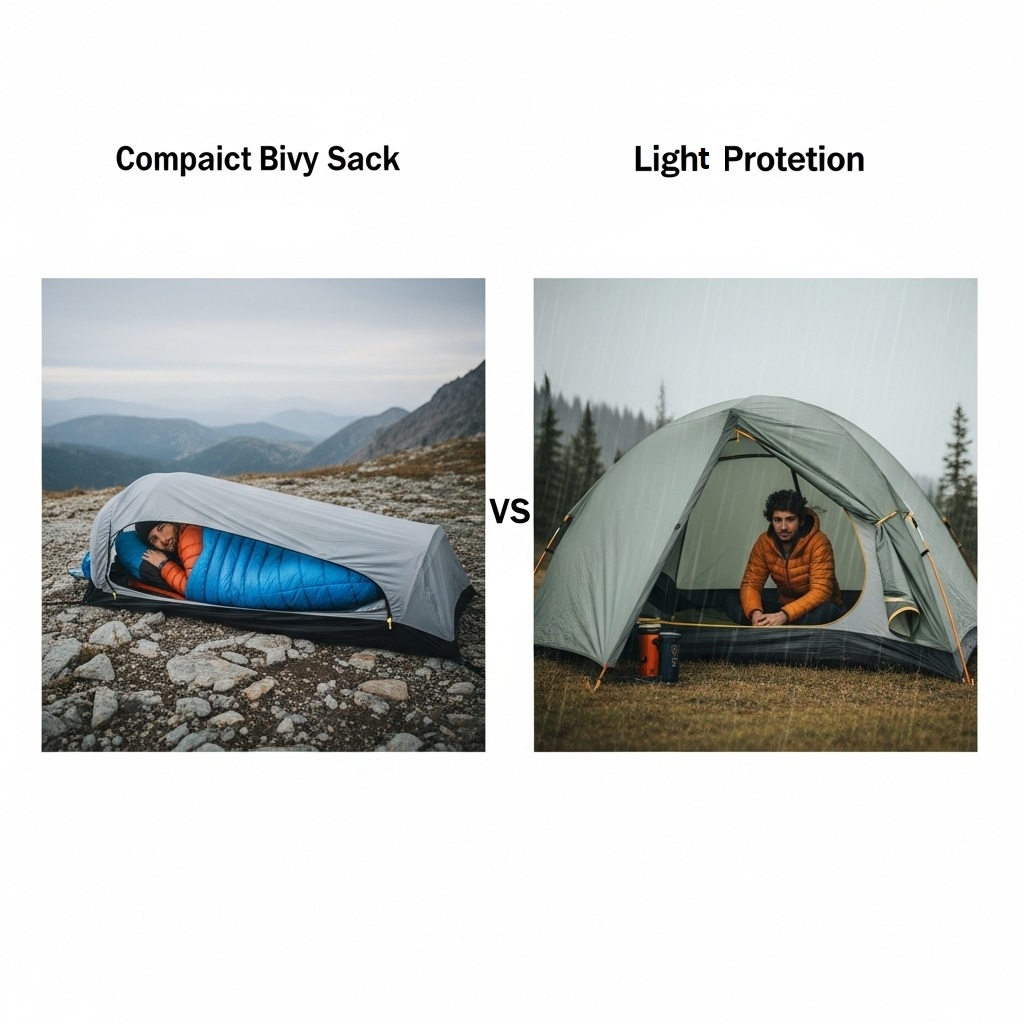This blog post may contain affiliate links. As an Amazon Associate I earn from qualifying purchases.
Imagine you’re planning your next outdoor adventure. Whether it’s a weekend in the woods or a multi-day trek through the mountains, the question of shelter is crucial.
You’ve probably seen campers and hikers debating the classic bivy vs tent dilemma. It’s a decision that can make or break your experience in the wild. You want something that keeps you dry, comfortable, and safe, right? But which one is truly the best for you?
Dive into this guide to discover the pros and cons of each option, tailored to meet your specific needs. We’ll break down the differences, helping you choose the perfect fit for your next escape into nature. Make sure you don’t miss out on the insights that could transform your outdoor adventures from ordinary to extraordinary. Keep reading to find out which shelter suits your style and elevates your camping experience.
Bivy Basics
When exploring the great outdoors, choosing the right shelter is crucial. Whether you’re into tent camping or prefer something more minimalist, your choice can impact your experience. Enter the world of bivy sacks, a popular choice among those seeking ultralight shelter options. Bivouac, or bivy sacks, offer portable sleeping solutions ideal for outdoor enthusiasts who prioritize weight and space. Let’s dive into the basics of bivy sacks and see how they stack up against traditional tents.
Also Read: Tent Vs Teepee: Which Shelter Suits Your Adventure?
Bivy Sack: A Compact Solution

The bivy sack is a lightweight alternative to the traditional tent. It’s essentially a waterproof sleeping bag cover, providing a simple form of shelter. This makes it perfect for hikers who aim to carry minimal gear. It’s an excellent choice for those long hiking trips where every ounce matters.
Weather Protection: Essential For Survival
Bivy sacks offer excellent weather protection. Many are designed with water-resistant materials to keep you dry during unexpected showers. While they might not provide the same level of protection as a larger tent, they can still keep you safe from the elements. Always consider the weather conditions before choosing your outdoor gear.
Camping Vs Hiking: Different Needs, Different Gear
For those who love tent camping, the traditional tent remains a favorite. It offers space for gear and a cozy shelter for multiple people. On the other hand, bivy sacks are tailored for solo adventurers. They cater to hikers who need to set up quickly and move on. Choose your gear based on your adventure type.
Ultralight Shelter: The Minimalist’s Choice
Bivy sacks are the epitome of ultralight shelter. They are compact, easy to pack, and quick to set up. This makes them ideal for those spontaneous overnight hikes. If reducing weight is a priority, a bivy sack might just be the perfect companion.
Comparing Bivy Sacks And Lightweight Tents
| Feature | Bivy Sack | Lightweight Tent |
|---|---|---|
| Weight | 1-2 lbs | 3-5 lbs |
| Setup Time | 5 minutes | 10-15 minutes |
| Space | Single Person | 1-2 Persons |
| Weather Protection | Basic | Advanced |
Outdoor Gear: Selecting The Right Equipment
Choosing between a bivy sack and a tent depends on your needs. Consider the weight, space, and weather conditions. For hiking, a bivy might be the right fit. For a relaxed camping trip, a tent could offer more comfort. Always assess your camping essentials before setting out.
Tent Features

Choosing between a bivy and a tent depends on your camping needs. Each option has unique advantages. Tents offer more space and comfort, while bivy sacks are compact and lightweight. Understanding tent features can help you make an informed choice. Let’s dive into the key features of tents to see how they stack up against bivy sacks.
Space And Comfort
Tents provide ample space, making them ideal for group camping. You can move around easily inside a tent. This is a significant advantage over a bivy sack, which is more confined. Many tents have room for storing gear, enhancing your camping experience. The extra space also allows for added comfort, especially in unpredictable weather conditions.
Tents are designed to protect against harsh weather. They often have rain flies and durable materials to keep you dry. This is crucial in rainy or windy conditions. Weather protection is a major consideration for those who want to ensure a safe camping trip. In contrast, a bivy sack offers less protection against the elements.
Ease Of Setup
Setting up a tent can be straightforward with practice. Many modern tents have quick setup features. This can save time and effort at the campsite. A bivy sack is simpler, but a tent offers more stability and structure. For those who value ease of use, a tent’s setup process can be manageable with a little preparation.
Portability And Storage
While tents can be bulkier, many are designed for easy transport. Portability and storage are essential for those who enjoy ultralight backpacking. A tent can be packed into a compact form. This makes it a viable option for those who prioritize lightweight camping. Compare this to a bivy sack, which excels in portability but lacks spacious storage.
Additional Features
Many tents come with additional features that enhance the camping experience. These can include vestibules for gear storage, multiple doors for easy access, and ventilation systems to reduce condensation. Such features add value to the tent camping experience, making it a versatile choice for various outdoor sleeping options.
| Feature | Tent | Bivy Sack |
|---|---|---|
| Space | Ample | Limited |
| Weather Protection | High | Moderate |
| Setup | Moderate | Simple |
| Portability | Moderate | High |
| Additional Features | Various | Few |
Weight Comparison
When choosing an outdoor shelter for your adventures, the debate between bivy and tent often arises. One of the most important factors in this decision is weight. For those who prioritize portability, understanding the weight comparison between these two options is essential. Whether you’re interested in lightweight camping or need to pack your camping gear efficiently, the weight of your shelter can significantly impact your hiking experience. Let’s dive into the details of how bivies and tents compare in terms of weight.
Understanding The Basics Of Bivy And Tent Weights
Bivouacs, commonly known as bivies, are designed for the minimalist camper. They are lightweight and compact, making them a popular choice for those who prioritize portability. On the other hand, tents vary widely in weight depending on their type and size. Some ultralight tent types compete with bivies in terms of weight, yet offer more space.
Also Read: Tent Footprint Vs Tarp: Ultimate Gear Showdown
Weight Breakdown: Bivy Vs Tent
| Item | Average Weight (lbs) |
|---|---|
| Bivy | 1-2 |
| Ultralight Tent | 2-3 |
| Standard Tent | 3-6 |
This table provides a clear comparison of the average weights for each type of outdoor shelter. Notice the significant weight difference between a bivy and a standard tent.
Factors Influencing Weight
- Material: The fabric and poles used can add extra pounds.
- Capacity: Larger tents accommodate more people, thus weigh more.
- Design: Features like double walls and extra vestibules impact weight.
Understanding these factors helps in selecting the right option for your camping safety and weather protection needs.
Why Choose A Bivy For Lightweight Camping
Bivies offer a simple solution for those who travel light. Their minimal weight and compact size make them ideal for solo hikers or those with limited space in their hiking essentials. Paired with a lightweight sleeping bag, a bivy provides adequate weather protection without the bulk of a traditional tent.
Choosing The Right Tent For Weight And Comfort
If comfort and space are your priorities, an ultralight tent might be the best choice. These tents balance portability with the benefits of a traditional shelter. While they may weigh more than a bivy, they offer extra room for gear and a more comfortable sleeping area.
Weather Protection
Choosing between a bivy and a tent for your camping gear often hinges on several factors. One critical consideration is weather protection. Whether you’re into ultralight backpacking or prefer traditional tent camping, staying dry and warm is essential. Both outdoor sleeping solutions have their own strengths and weaknesses in shielding you from the elements.
Weather Protection In A Bivouac Shelter
A bivouac shelter, or bivy sack, provides a snug cocoon against the weather. Its compact design ensures excellent weather protection by minimizing exposed surface area. Most bivy sacks feature waterproof and breathable materials, keeping you dry during rain or snow. Wind resistance is another significant advantage, as the low-profile design reduces wind impact.
Yet, condensation can be an issue with bivy sacks. Ventilation is limited, which may lead to moisture build-up inside. This factor is crucial if you’re considering bivy sack advantages for lightweight camping.
Weather Protection In A Tent
Tents offer more space and comfort, often coming equipped with rainflys and vestibules for added weather protection. The double-layer design of most tents provides an extra barrier against rain and wind. If you’re planning a longer stay, tents can be more comfortable during inclement weather.
On the downside, tents can be bulkier and require more time for setup. When considering portability and setup, bivies often win. But in harsh weather, a tent offers a more reliable shield.
Comparison Table: Bivy Vs Tent Weather Protection
| Feature | Bivy | Tent |
|---|---|---|
| Water Resistance | High | Very High |
| Wind Resistance | Very High | High |
| Condensation | Potential Issue | Less Likely |
| Space and Comfort | Limited | Ample |
Both options have their merits, and your choice depends on your camping style. Whether you prioritize ultralight backpacking or more space and comfort, understanding the weather protection each offers is vital.
Setup And Take Down
Choosing the right hiking shelter is crucial for any outdoor adventure. Whether you’re embracing ultralight camping gear or sticking with traditional camping gear, setup and take down are important factors. The comparison between a bivy sack and a tent highlights the differences in convenience and efficiency. Understanding these differences helps outdoor enthusiasts make informed decisions.
Setup Convenience: Bivy Vs Tent
Bivouac shelters, known as bivy sacks, offer simplicity in setup. Their design is straightforward, requiring minimal effort. A waterproof bivy can be laid out and secured within minutes, making it ideal for ultralight camping gear enthusiasts. It appeals to those seeking quick and easy outdoor sleeping options.
Compact tents, on the other hand, involve more steps. Poles need assembly, and securing the tent to the ground demands attention. Yet, tents provide more space. This might be worth the extra time for some. Tent vs bivy sack decisions often hinge on this balance between ease and comfort.
Speed Of Take Down
Taking down a bivy is swift and uncomplicated. Being a portable shelter, its design favors rapid packing. Lightweight camping enthusiasts appreciate this efficiency. A quick roll and it’s ready to be stowed away.
Conversely, tents require a systematic approach. Disassembling poles and folding fabric takes time. Ensuring all components fit back into their carry bag is a common challenge. Despite this, compact tents offer a structured space that some find indispensable.
Comparison Table: Bivy Vs Tent Setup And Take Down
| Aspect | Bivy | Tent |
|---|---|---|
| Setup Time | Quick (5-10 minutes) | Moderate (15-30 minutes) |
| Take Down Time | Rapid (5 minutes) | More Time (15 minutes) |
| Complexity | Simple | Detailed |
| Space | Limited | Spacious |
In summary, for those seeking ultralight camping gear, a bivy offers speed and simplicity. Compact tents provide comfort but require extra effort. Weighing these factors helps in choosing the best outdoor sleeping options.
Cost Considerations
When planning an outdoor adventure, choosing between a bivy and a tent can affect your budget. Understanding cost considerations is crucial for campers, especially those interested in ultralight shelter options. Both choices have their own set of expenses, which can influence your decision based on your specific needs. Below, we delve into the financial aspects of choosing a bivouac or a tent.
Cost Of Purchase
Buying a bivy bag often costs less than a tent. This makes it an attractive option for those seeking affordable outdoor sleeping options. Bivouacs are usually simpler and require fewer materials, making them cheaper.
| Type | Average Cost |
|---|---|
| Bivy Bag | $50 – $150 |
| Tent | $100 – $300 |
Portability And Weight
When considering camping gear, portability is key. Bivouacs are lightweight, aiding in easy transport during your outdoor adventure. They are a preferred choice for those focused on lightweight camping. Tents, while heavier, offer more space and comfort.
- Bivy Bags: 1-2 pounds
- Tents: 3-7 pounds
Weather Protection Costs
Weather protection is a critical factor. Tents generally offer better weather resistance, but at a higher cost. Bivouacs provide basic protection but may require additional gear, like a durable sleeping bag, for extreme conditions.
Investing in quality weather-resistant gear can add to your overall expenses. Evaluating the climate of your camping destination helps in making a cost-effective decision.
Additional Gear And Accessories
Consider the additional gear needed for both options. Tents might require ground tarps or extra stakes. Bivy users might need a sleeping bag alternative for added comfort. These accessories can impact your overall budget.
- Tent Accessories: Ground tarp, extra stakes
- Bivy Accessories: Sleeping bag liner, waterproof cover
Evaluating these cost considerations helps you choose the right shelter for your needs. Whether you prioritize affordability or additional features, understanding the financial aspects of tent vs bivy bag is essential for a successful camping experience.
Frequently Asked Questions
Are Bivvys Better Than Tents?
Bivvys are more compact and lighter than tents, ideal for minimalistic camping. Tents offer more space and comfort, providing better protection against harsh weather. Your choice depends on personal preference and the specific outdoor activity. Consider your needs, such as weather conditions and desired comfort levels, when choosing between them.
Is A Bivy Warmer Than A Tent?
A bivy is generally warmer than a tent due to its snug fit and minimal airspace. It retains body heat efficiently, making it suitable for cold conditions. Tents, with more space, can be draftier but offer better ventilation, which is helpful in milder climates.
Choose based on your specific needs and environment.
Can A Bivy Replace A Tent?
A bivy can replace a tent for solo backpackers seeking lightweight gear. It offers minimal shelter, weather protection, and quick setup. However, it lacks space for gear and comfort. Suitable for mild conditions, it may not be ideal for long trips or harsh weather.
When To Use A Bivy Tent?
Use a bivy tent for solo camping trips or minimalist backpacking. It’s ideal for lightweight, compact shelter. Choose it for quick set-up in limited space. Opt for bivy tents in remote locations where carrying bulky gear is impractical. Perfect for hikers and climbers needing efficient, portable protection.
What Is The Difference Between A Bivy And A Tent?
A bivy is smaller and lighter. A tent offers more space and protection.
Which Is Better For Solo Camping, Bivy Or Tent?
A bivy is best for solo camping. It’s compact and easy to set up.
Conclusion
Choosing between a bivy and tent depends on your adventure needs. Bivies offer simplicity and save weight. Tents provide more comfort and space. Consider weather conditions and trip duration. Bivies work well for short, solo trips. Tents suit longer journeys with friends.
Both options have pros and cons. Think about your priorities. Do you need quick setup or extra room? Decide what suits your style best. Enjoy your outdoor experience, whether under a bivy or inside a tent. Your choice impacts comfort and convenience.
Choose wisely for a memorable trip.


